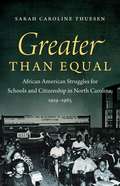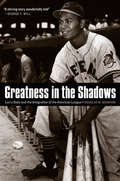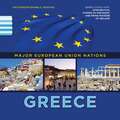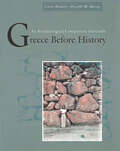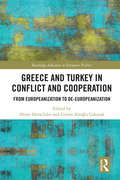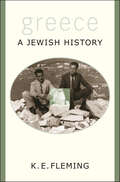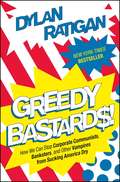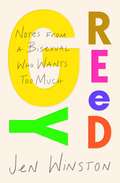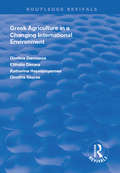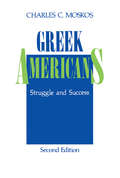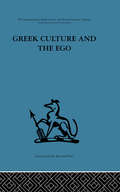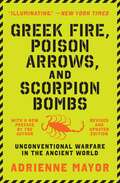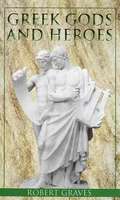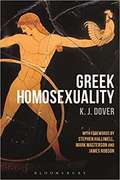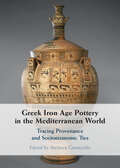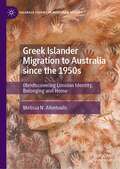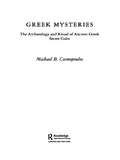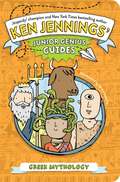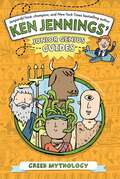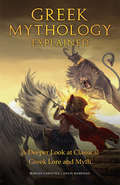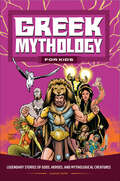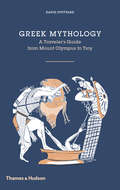- Table View
- List View
Greater than Equal
by Sarah Caroline ThuesenDuring the half century preceding widespread school integration, black North Carolinians engaged in a dramatic struggle for equal educational opportunity as segregated schooling flourished. Drawing on archival records and oral histories, Sarah Thuesen gives voice to students, parents, teachers, school officials, and civic leaders to reconstruct this high-stakes drama. She explores how African Americans pressed for equality in curricula, higher education, teacher salaries, and school facilities; how white officials co-opted equalization as a means of forestalling integration; and, finally, how black activism for equality evolved into a fight for something "greater than equal--integrated schools that served as models of civic inclusion. These battles persisted into the Brown era, mobilized black communities, narrowed material disparities, fostered black school pride, and profoundly shaped the eventual movement for desegregation. Thuesen emphasizes that the remarkable achievements of this activism should not obscure the inherent limitations of a fight for equality in a segregated society. In fact, these unresolved struggles are emblematic of fault lines that developed across the South, and serve as an urgent reminder of the inextricable connections between educational equality, racial diversity, and the achievement of first-class citizenship.
Greatness in the Shadows: Larry Doby and the Integration of the American League
by Douglas M. BransonJust weeks after Jackie Robinson joined the Brooklyn Dodgers, Larry Doby joined Robinson in breaking the color barrier in the major leagues when he became the first black player to integrate the American League, signing with the Cleveland Indians in July 1947. Doby went on to be a seven-time All-Star center fielder who led the Indians to two pennants. In many respects Robinson and Doby were equals in their baseball talent and experiences and had remarkably similar playing careers: both were well-educated, well-spoken World War II veterans and both had played spectacularly, albeit briefly, in the Negro Leagues. Like Robinson, Doby suffered brickbats, knock-down pitches, spit in his face, and other forms of abuse and discrimination. Doby was also a pioneering manager, becoming the second black manager after Frank Robinson. Well into the 1950s Doby was the only African American All-Star in the American League during a period in which fifteen black players became National League All-Stars. Why is Doby largely forgotten as a central figure in baseball’s integration? Why has he not been accorded his rightful place in baseball history? Greatness in the Shadows attempts to answer these questions, bringing Doby’s story to life and sharing his achievements and firsts with a new generation.
Greece (Major European Union Nations)
by Kim EtingoffGreece's economy has struggled a lot in recent years, but it has a long, rich history to draw on to help solve its problems. Greece is known as the birthplace of democracy and the Olympics, among many other things. It has been a member of the EU since 1981. Today, the EU and Greece are working together to help solve this country's serious economic problems. Discover more about this exciting, modern nation!
Greece Before History: An Archaeological Companion and Guide
by Curtis Runnels Priscilla MurrayThis book, a guide and companion to the prehistoric archaeology of Greece, is designed for students, travelers, and all general readers interested in archaeology. Greece has perhaps the longest and richest archaeological record in Europe, and this book reviews what is known of Greece from the earliest inhabitants in the Stone Age to the end of the Bronze Age and the collapse of the Minoan and Mycenaean civilizations. The book describes the prehistoric cultures of Greece in chronological order, and illustrates with 98 detailed drawings each culture's typical artifacts, architecture, burial customs, and art. Written in an informal and accessible style free of scientific jargon, the book can be used in the classroom or as a guide for the traveler, or read simply for pleasure by anyone with a curiosity about the earliest ages of this fascinating region. Although intended for a wide audience, the book has a solid scientific foundation. The authors are professional archaeologists with more than 25 years of experience in the field and with a first-hand knowledge of the methods and results of contemporary research. There is no other book today that covers the same range of periods and subjects, making it essential reading for anyone interested in the early civilizations that shaped the Greek landscape, laid the foundations for Classical Greek civilization, and contributed in many ways to the formation of the modern Greek world. The authors have been careful to address the many questions concerning prehistoric Greece that have been asked them by students and visitors to Greece through the years. The illustrations were created especially for this book, showing familiar artifacts and sites from a new perspective, and selecting others for illustration that rarely, if ever, appear in popular publications.
Greece and Turkey in Conflict and Cooperation: From Europeanization to De-Europeanization (Routledge Advances in European Politics)
by Alexis Heraclides Gizem Alio 287 Lu ÇakmakThis book offers a sober, contemplative and comprehensive coverage of Greek–Turkish relations, covering in depth the current political climate, with due regard to the historical dimension. The book includes up-to-date accounts of the traditional areas of unresolved discord (Aegean, minorities, Cyprus, the Patriarchate), with emphasis on why they remain contentious, despite the thaw in Greek–Turkish relations from 1999 until recently. It also covers new topics and challenges that have led to cooperation as well as friction, such as unprecedented economic cooperation, energy resources, or the refugee crisis. Furthermore, the volume deals with the ‘Europeanization’ of Greek–Turkish relations and other facilitating factors as they appeared in the first decade of the 21st century (including the role of civil society) as well as the contrary, ‘de-Europeanization’ from the 2010 onwards, which presages a hazardous downward trend in their relations, often not helped by the media in both countries, which is also examined. This volume will be essential reading to scholars and students of Greek–Turkish relations, more generally Greece and Turkey, and more broadly to the study of South European Politics, European Union politics, security studies and International Relations.
Greece: A Jewish History
by K. E. FlemingK. E. Fleming's Greece--a Jewish History is the first comprehensive English-language history of Greek Jews, and the only history that includes material on their diaspora in Israel and the United States. The book tells the story of a people who for the most part no longer exist and whose identity is a paradox in that it wasn't fully formed until after most Greek Jews had emigrated or been deported and killed by the Nazis. For centuries, Jews lived in areas that are now part of Greece. But Greek Jews as a nationalized group existed in substantial number only for a few short decades--from the Balkan Wars (1912-13) until the Holocaust, in which more than 80 percent were killed. Greece--a Jewish History describes their diverse histories and the processes that worked to make them emerge as a Greek collective. It also follows Jews as they left Greece--as deportees to Auschwitz or émigrés to Palestine/Israel and New York's Lower East Side. In such foreign settings their Greekness was emphasized as it never was in Greece, where Orthodox Christianity traditionally defines national identity and anti-Semitism remains common.
Greedy Bastards
by Dylan RatiganThe host of the eponymous MSNBC show, Dylan Ratigan offers a bold and original post-partisan program to resuscitate the American Dream. At a time of deep concern with the state of America's economy and government, it seems that all the media can give us is talking (or screaming) heads who revel in partisan brinkmanship. Then there's Dylan Ratigan--an award-winning journalist respected and admired across the political spectrum. In Greedy Bastards, he rips the lid off of our deeply crooked system--and offers a way out.Employing the nuanced reporting and critical analysis that have earned him so much respect, Ratigan describes the five "vampires" that are sucking the nation dry, including an educational system that values mediocrity above all else; a healthcare system that is among the priciest and least-effective infrastructures in the industrialized world; a political system in which lobbyists write legislation; a "master-slave" relationship with our Chinese bankers; and an addiction to foreign oil that has sapped our willingness to innovate. In offering solutions to these formidable and entrenched obstacles, he does nothing less than lay the groundwork for a political movement dedicated to tackling the rot at the heart of the country. In its desperation, America needs more than just endless stock tips and Wall Street navel-gazing. It needs passionate debate and smart policy--and a hero to take on the establishment. Dylan Ratigan is that hero, and this is the book that will rally people behind him. make it right.
Greedy: Notes from a Bisexual Who Wants Too Much
by Jen WinstonNamed one of the Best Books of 2021 by Oprah Daily, Glamour, Shondaland, BuzzFeed, and more! A hilarious and whip-smart collection of essays, offering an intimate look at bisexuality, gender, and, of course, sex. Perfect for fans of Lindy West, Samantha Irby, and Rebecca Solnit—and anyone who wants, and deserves, to be seen. If Jen Winston knows one thing for sure, it&’s that she&’s bisexual. Or wait—maybe she isn&’t? Actually, she definitely is. Unless…she&’s not? Jen&’s provocative, laugh-out-loud debut takes us inside her journey of self-discovery, leading us through stories of a childhood &“girl crush,&” an onerous quest to have a threesome, and an enduring fear of being bad at sex. Greedy follows Jen&’s attempts to make sense of herself as she explores the role of the male gaze, what it means to be &“queer enough,&” and how to overcome bi stereotypes when you&’re the posterchild for all of them: greedy, slutty, and constantly confused. With her clever voice and clear-eyed insight, Jen draws on personal experiences with sexism and biphobia to understand how we all can and must do better. She sheds light on the reasons women, queer people, and other marginalized groups tend to make ourselves smaller, provoking the question: What would happen if we suddenly stopped? Greedy shows us that being bisexual is about so much more than who you&’re sleeping with—it&’s about finding stability in a state of flux and defining yourself on your own terms. This book inspires us to rethink the world as we know it, reminding us that Greedy was a superpower all along.
Greek Agriculture in a Changing International Environment (Routledge Revivals)
by Dimitris Damianos Efthalia Dimara Katharina Hassapoyannes Dimitris SkurasPublished in 1998, the aim of this text is to promote awareness of the evolution of Greek agriculture, as well as of the development of national strategies, in conformity with the Common Agricultural Policy provision - which is important for a successful confrontation of modern and prospective international challenges. It offers a case study developing integrated policies for unemployment, for prevention of diversification of rural areas and for provision of solutions to the problem of increasing competition, while enhancing environmental quality and making rational use of productive resources.
Greek Americans: Struggle and Success
by Charles C. MoskosThis is an engrossing account of Greek Americans--their history, strengths, conflicts, aspirations, and contributions. This is the story of immigrants, their children and grandchildren, most of whom maintain an attachment to Greek ethnic identity even as they have become one of this country's most successful ethnic groups.
Greek Art And Archaeology
by Richard T. NeerThis is the text that sets a new standard in its field with striking visuals, fascinating reconstructions, accessible prose, and coverage of the wider Greek world. The Second Edition extends student understanding of Greek art in history through richer archaeological context and expanded coverage of both the earliest Bronze Age and latest Hellenistic periods.
Greek Culture and the Ego: A psycho-analytic survey of an aspect of Greek civilization and of art
by Adrian StokesTavistock Press was established as a co-operative venture between the Tavistock Institute and Routledge & Kegan Paul (RKP) in the 1950s to produce a series of major contributions across the social sciences. This volume is part of a 2001 reissue of a selection of those important works which have since gone out of print, or are difficult to locate. Published by Routledge, 112 volumes in total are being brought together under the name The International Behavioural and Social Sciences Library: Classics from the Tavistock Press. Reproduced here in facsimile, this volume was originally published in 1958 and is available individually. The collection is also available in a number of themed mini-sets of between 5 and 13 volumes, or as a complete collection.
Greek Culture in the Roman World: Greek Myths in Roman Art and Culture
by Zahra NewbyImages of episodes from Greek mythology are widespread in Roman art, appearing in sculptural groups, mosaics, paintings and reliefs. They attest to Rome's enduring fascination with Greek culture, and its desire to absorb and reframe that culture for new ends. This book provides a comprehensive account of the meanings of Greek myth across the spectrum of Roman art, including public, domestic and funerary contexts. It argues that myths, in addition to functioning as signifiers of a patron's education or paideia, played an important role as rhetorical and didactic exempla. The changing use of mythological imagery in domestic and funerary art in particular reveals an important shift in Roman values and senses of identity across the period of the first two centuries AD, and in the ways that Greek culture was turned to serve Roman values.
Greek Culture in the Roman World: Roman Festivals in the Greek East
by Fritz GrafThis study explores the development of ancient festival culture in the Greek East of the Roman Empire, paying particular attention to the fundamental religious changes that occurred. After analysing how Greek city festivals developed in the first two Imperial centuries, it concentrates on the major Roman festivals that were adopted in the Eastern cities and traces their history up to the time of Justinian and beyond. It addresses several key questions for the religious history of later antiquity: who were the actors behind these adoptions? How did the closed religious communities, Jews and pre-Constantinian Christians, articulate their resistance? How did these festivals change when the empire converted to Christianity? Why did emperors not yield to the long-standing pressure of the Church to abolish them? And finally, how did these very popular festivals - despite their pagan tradition - influence the form of the newly developed Christian liturgy?
Greek Fire, Poison Arrows, and Scorpion Bombs: Unconventional Warfare in the Ancient World
by Adrienne MayorA gripping and groundbreaking history of how ancient cultures developed and used biological, chemical, and other unconventional weapons of warFlamethrowers, poison gases, incendiary bombs, the large-scale spreading of disease: are these terrifying agents of warfare modern inventions? Not by a long shot. In this riveting history of the origins of unconventional war, Adrienne Mayor shows that cultures around the world have used biological and chemical weapons for thousands of years—and debated the morality of doing so. Drawing extraordinary connections between the mythical worlds of Hercules and the Trojan War, the accounts of Herodotus and Thucydides, and modern methods of war and terrorism, this richly illustrated history catapults readers into the dark and fascinating realm of ancient war and mythic treachery.
Greek Gods and Heroes
by Robert Graves"Almost all arts and useful sciences were given us by the ancient Greeks: such as astronomy, mathematics, engineering, architecture, medicine, money, literature, and law. Even modern scientific language is mostly formed from Greek words. They were the first people in Europe to write books, and two long poems by Homer--about the siege of Troy and the adventures of Odysseus--are still read with pleasure though he lived more than seven hundred years before the birth of Christ. After Homer came Hesiod, who wrote among other things about gods, and fighting men, and the Creation. The Greeks greatly respected Homer and Hesiod, and the stories (now called "myths") which they and other poets told, became part of school education not only in Greece, but wherever the Greek language had spread--from Western Asia to North Africa and Spain."-Introduction
Greek Homosexuality
by K. J. DoverHailed as magisterial when it first appeared, Greek Homosexuality remains an academic milestone and continues to be of major importance for students and scholars of gender studies. Kenneth Dover explores the understanding of homosexuality in ancient Greece, examining a vast array of material and textual evidence that leads him to provocative conclusions. <p> This new release of the 1989 second edition, for which Dover wrote an epilogue reflecting on the impact of his book, includes two specially commissioned forewords assessing the author's legacy and the place of his text within modern studies of gender in the ancient world.
Greek Iron Age Pottery in the Mediterranean World: Tracing Provenance and Socioeconomic Ties
by Stefanos GimatzidisGreek pottery is the most visible archaeological evidence of social and economic relations between the Aegean and the Mediterranean during the Iron Age, a period of intense mobility. This book presents a holistic study of the earliest Greek pottery exchanged in Greek, Phoenician, and other Indigenous Mediterranean cultural contexts from multidisciplinary perspectives. It offers an examination of 362 Protogeometric and Geometric ceramic and clay samples, analysed by Neutron Activation, that Stefanos Gimatzidis obtained in twenty-four sites and regions in eight countries. Bringing a macro-historical approach to the topic through a systematic survey of early Greek pottery production, exchange, and consumption, the volume also provides a micro-history of selected ceramic assemblages analysed by a team of scholars who specialise in Classical, Near Eastern, and various prehistoric archaeologies. The results of their collaborative archaeological and archaeometric studies challenge previous reconstructions of intercultural relations between the Aegean and the Mediterranean and call into question established narratives about Greek and Phoenician migration.
Greek Islander Migration to Australia since the 1950s: (Re)discovering Limnian Identity, Belonging and Home (Palgrave Studies in Migration History)
by Melissa N. AfentoulisIlluminating the experiences of immigrants to Australia in the late twentieth century, this book uses oral history to explore how identity and belonging are shaped through migration. Between the 1950s and the 1970s, many inhabitants from the small Greek island of Limnos travelled to Australia to flee post-war devastation and economic disaster. With an emphasis on the lived experiences and memories of Limnians, the book sheds light on the emotional pain and trauma they felt as they were separated from their families and homeland. Moving away from more traditional outlooks on migration studies, this book emphasises the significance of ethno-regional identity, and analyses how it can bring strength and longevity to a constructed community. Both the roles of men and women within the Greek diaspora are examined, in the way that they made the difficult decision to leave their homeland, and subsequently how they came to nurture and build families within a new, evolving community. Looking beyond first-generation migration, the author analyses the pattern of return visits to Limnos by the descendants of migrants. Acting as a form of identity consolidation for second-generation migrants, this journey to the ancestral homeland highlights the fluidity of what it means to belong somewhere, and redefines the notion of ‘home’. The author provides an alternative perspective to traditional migration studies and reaffirms the importance of transnational identity. A unique and important addition to research, this book combines memory studies and oral narrative to analyse how identity and belonging can be shaped across borders, rather than within them.
Greek Mysteries: The Archaeology of Ancient Greek Secret Cults
by Michael B. CosmopoulosWritten by an international team of acknowledged experts, this excellent book studies a wide range of contributions and showcases new research on the archaeology, ritual and history of Greek mystery cults. With a lack of written evidence that exists for the mysteries, archaeology has proved central to explaining their significance and this volume is key to understanding a phenomenon central to Greek religion and society.
Greek Mythology (Ken Jennings’ Junior Genius Guides)
by Ken JenningsUnleash your inner genius and become a master of mythology with this interactive trivia book from Jeopardy! champ and New York Times bestselling author Ken Jennings.With this Junior Genius Guide to Greek mythology, you’ll become an expert and wow your friends and teachers with all the best ancient stories: how Prometheus outsmarted the gods, how Achilles’s heel led to his death, and how we mere mortals always seem to get mixed up in so many misadventures. With great illustrations, cool trivia, and fun quizzes to test your knowledge, this guide will have you on your way to whiz-kid status in no time!
Greek Mythology (Ken Jennings’ Junior Genius Guides)
by Ken JenningsUnleash your inner genius and become a master of mythology with this interactive trivia book from Jeopardy! host and champion and New York Times bestselling author Ken Jennings.With this Junior Genius Guide to Greek mythology, you&’ll become an expert and wow your friends and teachers with all the best ancient stories: how Prometheus outsmarted the gods, how Achilles&’s heel led to his death, and that most of our eighty-eight constellations are based on what Greeks and Romans imagined thousands of years ago! With great illustrations, cool trivia, and fun quizzes to test your knowledge, this guide will have you on your way to whiz-kid status in no time!
Greek Mythology Explained: A Deeper Look at Classical Greek Lore and Myth
by Marios Christou David RamenahA unique retelling of Greek mythological tales featuring love, betrayal, murder and ruthless ambitions—for fans of George R. R. Martin’s Game of Thrones.Discover six classic Greek myths in this exciting retelling that paints both famous and lesser-known characters in a whole new light. Follow the likes of Odysseus, Lamia, Bellerophon, Icarus, Medusa and Artemis as their fates are revealed through bloody trials, gut-wrenching betrayals, sinister motives and broken hearts. With an accessible writing style that delves into the thoughts, feelings, desires, and motivations of every character, these mythical figures and their compelling stories will resonate with readers as they are guided through perilous and tragic adventures.Greek Mythology Explained provides an in-depth analysis of each story told as it unravels the greater themes and valuable lessons hidden within each chapter. Inside these pages, you’ll . . .Sail with Odysseus as he navigates through the straits of Messina with a terrifying monster on each side, intent only on killing him and his crew.Witness Lamia’s world turned upside down as she loses her kingdom, her children and her humanity.Journey with Bellerophon as he battles the Chimera and becomes the hero that he was destined to be.Take flight with Icarus and Daedalus as they escape their confinement and the Cretan navy.Follow Medusa as she loses faith in the gods and becomes the monster she so adamantly wished to protect her people from.Experience the love between Artemis and Orion, as well as the bitter jealousy it spawns at the core of her brother Apollo.
Greek Mythology for Kids: Legendary Stories of Gods, Heroes, and Mythological Creatures
by Zachary HambyWhether you're fighting alongside Zeus in the war against the Titans or witnessing the sabotage of Artemis's love for the mortal Orion, this Greek mythology book for kids 8 to12-year-olds will thrill with extraordinary stories from Greek legend! Greek gods and goddesses continue to capture our imaginations with tales of epic battles and star-crossed love. Experience adventure and enchantment with this book about Greek mythology.Greek Mythology for Kids has it all:Classic characters—Dive into 20 exciting, kid-friendly tales featuring the antics of favorite characters like Aphrodite, the goddess of love, Hermes, messenger of the gods, and Persephone, queen of the underworld. Dramatic illustrations—Watch the awe-inspiring world of Greek mythology come to life with the bold art in the style of a graphic novel for kids. A guide to the Greeks—Learn who did what and where with a handy guide to characters and locations that makes exploring Greek mythology fun and easy. Venture into the unknown with Greek Mythology for Kids!
Greek Mythology: A Traveler's Guide
by David StuttardA hands-on traveler's guide to the enthralling tales of Greek mythology, organized around the cities and landscapes where the events are set The Greek myths have a universal appeal, beyond the time and physical place in which they were created. But many are firmly rooted in specific landscapes: the city of Thebes and mountain range Cithaeron dominate the tale of Oedipus; the city of Mycenae broods over the fates of Agamemnon and Electra; while Knossos boasts the scene of Theseus' slaying of the Minotaur. Drawing on a wide range of classical sources, newly translated by the author, and illustrated with specially commissioned drawings, this book is both a useful read for those visiting the sites and a fascinating imaginative journey for the armchair traveler. The itinerary includes twenty-two locations, from Mount Olympus to Homer's Hades, recounting the myths and history associated with each site and highlighting features that visitors can still see today. Scholarly text, supported by quotes from primary sources and contemporary research, as well as the enticing stories of gods and goddesses, heroes and villains, enrich the reader's literal or simply literary experience of these sites, whose significance still resonates today.
